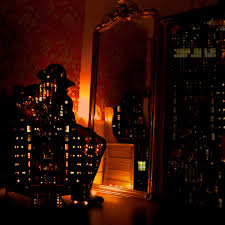Tom Lecky’s fourth album as Hallock Hill is a slow worker. Like all of his releases, it insinuates itself into your life, and gradually takes it over. The first time you play this record, you barely notice that it’s there; but you keep returning to it, on grey rainy afternoons, on hungover Sunday mornings when it’s about all you can face, and slowly it begins to flower, revealing new aspects, fresh layers on each listen. And without quite knowing how or when, you find that its subtle rhythms have become your own, its quiet, patient piano sketches as essential as breathing. If you spend enough time in Kosloff Mansion you’ll find you can never leave.
What makes this the most essential Hallock Hill record yet, for me, is the presence alongside Lecky of co-producer and collaborator Tim Noble, of Hundred Acre labelmates the Lowland Hundred. Noble’s considered setting of Lecky’s fragile piano compositions makes Kosloff Mansion almost a dub album – while having absolutely no reggae influence whatsoever. Its lineage is European classical, austere minimalism; Erik Satie and Arvo Part by way of Brian Eno. But the use of studio as instrument, the sense of space and texture, the eerie and unnatural atmospherics that unbalance the listener in the manner of an ear infection, suggest King Tubby or Lee Perry if they’d come up through the 19th Century Conservatory tradition.
‘I Light The Lamp And Sit Down’ resonates in the darkness, a handful of hesitant piano notes each shining like fireflies, and with a lifespan as brief. ‘The Good Dead’ begins like the first random raindrops pattering against your window, before a peal of artificial thunder confirms the coming storm. But we’re sat behind thick glass, insulated and isolated, able to draw the curtains and retreat into private reverie.
Percussive echo and hypnotic chimes underlie the melancholy, thoughtful jazz flourishes of ‘The People Without Tears,’ while ‘Death Was A Bird’ suggests a Butoh dance piece, weaving through close, oppressive weather. ‘Villages Of The Black Earth’ is a dialogue between piano and chimes with neither instrument seeming to really understand what the other is saying, each passive-aggressively struggling to assert control of the conversation.
The pieces are fragments, dusty and querulous, laid out like broken shards of coloured glass on a velvet cloth, refusing to surrender any meaning or identity. ‘Another Light’ is almost whole, the ominous piano melody a linear narrative through terrain fraught with potholes and sudden drops, the landscape warping, dissolving and reconstructing itself as though to deliberately thwart any notion of progress. ‘Workbench Atheist’ creaks and strains; are the wooden beams about to give way, or is it just the house settling? The piano chords are solemn and unusually confident, self-absorbed amid the possibility of impending collapse. Perhaps the piano itself is somehow bound with taut ropes at the centre of the structure, holding it all together.
Noble’s sonic fracking of Hallock Hill’s previously virgin territory results in great sinkholes opening up beneath the endlessly reflecting oriental chimes of ‘Demons In The Birchwoods’, bottomless wells of sound which the high notes ricochet across. ‘Farewell Pale Corpse Of Many Sins’ and ‘The Immortalisation Commission’ are lonely walks across witch-haunted barrows and hilltops at dusk, where dark things cackle and flit on the periphery of your vision. Finally, ‘Massed Bands And Megaphones’ seems delightfully aimless amid random reverberating percussion like distant shellfire, or fireworks erupting from the far side of the dark November valley.
A slow worker, but an implacable one, Kosloff Mansion is ambient in the best sense, a series of rooms to lose yourself in, each with its own particular atmosphere and grace. Settle in; you may be here for some time.


